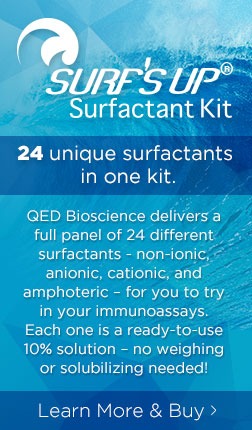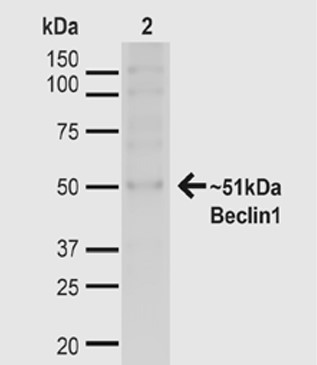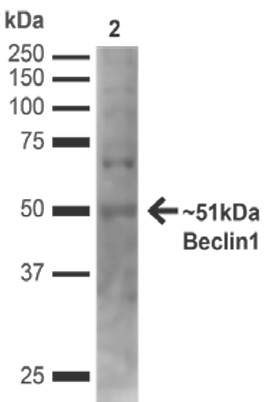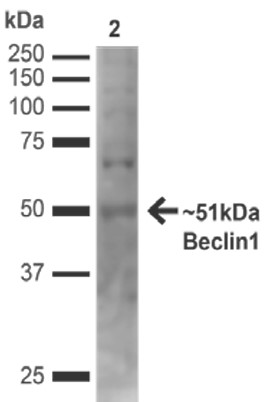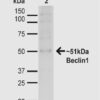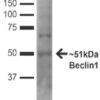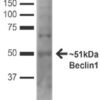Anti-Beclin 1 Antibody (23010)
$466.00
SKU: 23010
Categories: Antibody Products, Autophagy Antibodies, Products
Overview
Product Name Anti-Beclin 1 Antibody (23010)
Description Anti-Beclin1 Rabbit Polyclonal Antibody
Target Beclin 1
Species Reactivity Human
Applications WB,ICC/IF
Host Rabbit
Clonality Polyclonal
Immunogen Synthetic peptide corresponding to amino acids at the C-terminus of human Beclin 1.
Properties
Form Liquid
Concentration 1.0 mg/mL
Formulation PBS, pH 7.4, 50% glycerol, 0.09% sodium azide.Concentration: 1mg/ml
Buffer Formulation Phosphate Buffered Saline
Buffer pH pH 7.4
Buffer Anti-Microbial 0.09% Sodium Azide
Buffer Cryopreservative 50% Glycerol
Format Purified
Purification Purified by Protein A affinity chromatography
Specificity Information
Specificity This antibody recognizes human Beclin 1.
Target Name Beclin-1
Target ID Beclin 1
Uniprot ID Q14457
Alternative Names Coiled-coil myosin-like BCL2-interacting protein, Protein GT197 [Cleaved into: Beclin-1-C 35 kDa; Beclin-1-C 37 kDa]
Gene Name BECN1
Sequence Location Cytoplasm, Golgi apparatus, trans-Golgi network membrane, Endosome membrane, Endoplasmic reticulum membrane, Mitochondrion membrane, Endosome, Cytoplasmic vesicle, autophagosome
Biological Function Plays a central role in autophagy (PubMed:18570871, PubMed:21358617, PubMed:23184933, PubMed:23974797, PubMed:28445460). Acts as core subunit of the PI3K complex that mediates formation of phosphatidylinositol 3-phosphate; different complex forms are believed to play a role in multiple membrane trafficking pathways: PI3KC3-C1 is involved in initiation of autophagosomes and PI3KC3-C2 in maturation of autophagosomes and endocytosis. Involved in regulation of degradative endocytic trafficking and required for the abcission step in cytokinesis, probably in the context of PI3KC3-C2 (PubMed:20643123, PubMed:20208530, PubMed:23974797, PubMed:26783301). Essential for the formation of PI3KC3-C2 but not PI3KC3-C1 PI3K complex forms. Involved in endocytosis (PubMed:25275521). Protects against infection by a neurovirulent strain of Sindbis virus (PubMed:9765397). May play a role in antiviral host defense. {PubMed:18570871, PubMed:20208530, PubMed:20643123, PubMed:21358617, PubMed:23184933, PubMed:23974797, PubMed:25275521, PubMed:26783301, PubMed:28445460, PubMed:9765397, PubMed:21364619, PubMed:26263979}.
Research Areas Autophagy
Background Autophagy is a catabolic process that results in the degradation of bulk cytoplasmic contents within autophagosomes and lysosomes. Beclin 1, the mammalian orthologue of yeast Atg6, has a central role in autophagy. It interacts with several cofactors (Atg14L, UVRAG, Bif-1, Rubicon, Ambra1, HMGB1, nPIST, VMP1, SLAM, IP3R, PINK and survivin) to regulate the lipid kinase Vps-34 protein and promote formation of Beclin 1-Vps34-Vps15 core complexes, thereby inducing autophagy. Beclin 1 dysfunction has been implicated in many disorders including cancer and neurodegeneration.
Application Images




Description Immunoblotting: use at 12ug/ml. A band of ~51kDa is detected. Detection of Beclin 1 in 20ug HeLa cell lysate.

Description Detection of Beclin 1 in 20ug 293T cell lysate.

Description Immunofluorescence: use at 10ug/ml. Detection of Beclin 1 in formaldehyde-fixed neuroblastoma SK-N-BE cells.
Handling
Storage This antibody is stable for at least one (1) year at -20°C.
Dilution Instructions Dilute in PBS or medium that is identical to that used in the assay system.
Application Instructions Immunoblotting: use at 1- 2ug/mL. A band of ~51kDa is detected.
Immunofluorescence: use at 10ug/mL.
These are recommended concentrations.
Endusers should determine optimal concentrations for their applications.
Immunofluorescence: use at 10ug/mL.
These are recommended concentrations.
Endusers should determine optimal concentrations for their applications.
References & Data Sheet
Data Sheet  Download PDF Data Sheet
Download PDF Data Sheet
 Download PDF Data Sheet
Download PDF Data Sheet
